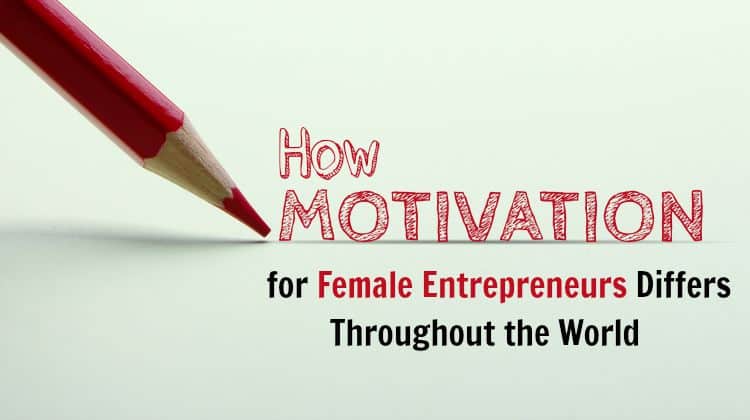
Over recent years, there has been a growing trend for female entrepreneurs launching new ventures at a higher rate than men. Within the EU, 34.4% of entrepreneurs are women, and in the United States, there are more than 6.2 million privately held, female-owned companies.
While these statistics are encouraging, the gender pay gap still persists (particularly in developing countries), and in order for governments to continually develop initiatives and resources that support women in business, research is attempting to understand the different motivational factors behind female entrepreneurship from country to country.
The academic study between entrepreneurship and gender-specific traits is a relatively new field of research that didn’t gain momentum until the late 1990s. However, over the last decade, there have been a number of studies that examine the wide array of factors that may contribute in varying degrees to “pushing” or “pulling” a woman into business ownership.
Understandably, the decision to start a business does not solely originate from a single motivating cause and can be influenced by education, personality, family considerations, and social circumstances. Geographical location, however, does play an important role with a number of “external” factors that can either promote or inhibit entrepreneurial ambition.
External Influences
The Gender-GEDI Executive Report ranks countries on a scale out of 100 based on a country’s entrepreneurial environment, ecosystem, and the individual aspirations of its women.
The report found that the conditions and characteristics in the US, Australia, and Sweden lead to higher levels of female entrepreneurship where governmental support, access to funding and cultural acceptance all contribute to supporting women in business.
Formal institutions and social attitudes, including diminished legal rights, restrictions on a woman’s activity outside the home, and her ability to inherit or own a property, are the primary global barriers women face when starting a business.
Influences including the local economy, bureaucracy in start-up procedures, and business regulations were found to be the same deterrents for all business owners regardless of gender.
Internal Motivations
In a study by Paypal that polled both current and aspiring female entrepreneurs in France, China, and the United States, the research found that women have different internal motivations for starting a businesses based on their physical location.
- 55% of women in the United States wanted to achieve a better work-life balance
- 48% of women in China wanted to “control their own future”
- 61% of women in France wanted to pursue entrepreneurship to have pride in themselves
There was however a common theme among all respondents who cited passion and independence as the universal motivations for their entrepreneurial ambition, not financial reward and commerce.
Industries
Specific countries were shown to be more popular within certain industries.
- France: Health, Beauty and Artisan Crafts
- China: Apparel & Accessories
- United States: Consulting
UK research conducted by e-Bay using government data found that for self-employed women, online retail was the most popular industry, rising by 28% between 2009 and 2014. An impressive number, particularly when looking at the other big European nations: 17% in France, 5% in Italy, and -2% in Germany.
The Tech Scene
An industry that has its fair share of controversy and heated debate is the tech industry. Throughout the world there is a uniformed lack of female startups in the tech sector. A surprising statistic considering that female-led private technology companies are more capital efficient, achieve 35% higher return on investment, and bring in 12% higher revenue than male-owned tech companies.
The reason for the lack of female representation in the tech scene, at first glance points, to a broader underlying issue of a male dominated labor force crowding out women, with only 1% of startups in Silicon Valley being founded by female entrepreneurs.
The counter argument as to why there are so few women in the tech industry isn’t because of discrimination, but simply because women aren’t as interested in technology-related work as men. It’s a conscious choice with many being motivated by the pursuit of their passion and to love what they do.
Of course, women are free to start any kind of company they want, and while the motivations will be unique to each individual’s personal circumstances, both governments and cultural differences across the world no doubt play an important role. With women sometimes identifying different problems than men, the world would certainly benefit from more female entrepreneurs to help drive our economy and society forward.
About the Author
This post was written by Katya Puyraud of Euro Start Entreprises. Helping entrepreneurs with company formation and incorporation in France, UK, US, Europe and the Emirates.